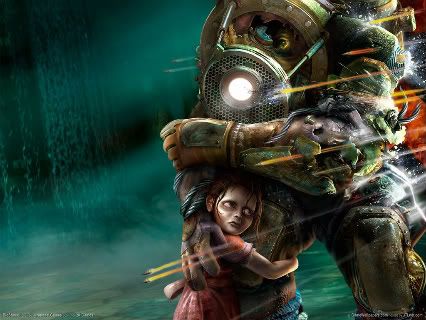
Each entertainment medium has one advantage over the others, that the very best examples exploit. Some music, through a process nobody fully understands, can instantly provoke feelings such as sadness or elation through sound alone; literature, connecting directly with your mind as it does, is capable of making the most preposterously unrealistic situations not only acceptable, but incredibly gripping and immersive; while TV & cinema can bombard the viewer with a mixture of highly evocative scripting, sounds and visuals (employing the finest writers, actors, musicians, and technology) to create an experience they’ll never forget. What is gaming’s advantage?
Interactivity; and it’s amazing just how underexploited this element has been over the past two decades or so.
Notoriously, big budget games have been pathetically desperate to emulate movies this generation. The problem is that developers try to emulate the movie industry via their cut scenes (and sometimes incidental dialogue); forgetting the fact that the budgets put aside for casting, direction, scripting, and cinematic computer graphics will never allow them to compete with the best that cinema has to offer. Also forgetting, of course, that games are meant to be played rather than watched. Nonetheless, there have been titles that have taken advantage of gaming’s interactivity in interesting ways.
Bioshock is a good example of this, though only in two instances; the moment you finally come face to face with Andrew Ryan (which I shan’t spoil for those yet to play the game) – and the first time you have a Little Sister at your mercy. Sadly, it is now virtually impossible to experience Bioshock as the developers intended; that is, with no idea of the details of the story including, crucially, the true nature of the Little Sisters. I was careful that this was how I first played the game. Therefore, when I was forced to either save or ‘harvest’ a Little Sister, I had to make the decision on very little information. One character was telling me this was a twisted little girl I had a chance to return to normality; another was telling me that this creature was no longer human, a monster beyond all help. I didn’t feel that I knew either person well enough to entirely trust one or the other, but I had to make a decision. I could be saving a little girl, or murdering one; destroying a dangerous monster, or setting one loose.
 In case you were wondering, I saved every Little Sister in the game.
In case you were wondering, I saved every Little Sister in the game.
There’s no denying that Bioshock 2 is inferior to its predecessor, but it’s still a good game in its own right. The Little Sister choice returns but, now that the choice is clear cut, with little emotional baggage. What you decide to do with the Little Sisters you meet on your travels affects the ending, as with the first game; but it also decides what happens during a brief yet memorable moment toward the end of the game. All I’ll say is that the impact of this moment is strengthened immeasurably by your participation – and once you realise that your actions have decided what is about to happen, you will almost certainly feel either relief or terror.
The flawed gem that is Nier makes you aware of your participation in a very clever way… after your first playthrough. Once the twist in the tale is laid bare and you’ve seen the first ending, the game allows you to replay the final third of the adventure with all of your weapons, XP etc. intact. The knowledge you now have – combined with extra incidental dialogue and cut scenes the second time around – give you a new perspective on your actions, and a deeper understanding of previously confusing events. Nonetheless, you are doomed to do everything exactly as you did before.
Jumping back a decade to the year 2000, we see the release of Deus Ex. Here was that thing that is still so sadly rare today: a game of true intelligence. A mature game in the proper sense, i.e. no bare breasts and/or gratuitous gore and/or profanity every few minutes purely for the sake of it. It dealt with deep and interesting issues and, most importantly of all, was great fun to play. You quickly found yourself wondering if you were on the right side; indeed, as the game progressed, you found yourself wondering if there were any ‘right’ side at all. The next Deus Ex game, Invisible War, was well received by professional critics; but seems to be universally spat upon by Deus Ex fans (though I have previously admitted that I actually rather enjoyed it). So strong is the hatred for Invisible War, in fact, that Square Enix are touting the upcoming Deus Ex: Human Revolution as ‘The true sequel to Deus Ex’ (despite it being a prequel).
 Another way Deus Ex leaned on the interactive element of videogames was to truly empower the player. Wherever possible, it was up to the player to decide how the protagonist progressed. Did he jump into a fight guns blazing? Set a trap? Or simply sneak past? Or perhaps he took the long way round, seeking an alternative route. I’d like to see Human Revolution expand on this idea further.
Another way Deus Ex leaned on the interactive element of videogames was to truly empower the player. Wherever possible, it was up to the player to decide how the protagonist progressed. Did he jump into a fight guns blazing? Set a trap? Or simply sneak past? Or perhaps he took the long way round, seeking an alternative route. I’d like to see Human Revolution expand on this idea further.
What frustrates me about moral choices in games is that, 99% of the time, it’s simply a case of being told ‘do this and be good, or do this and be evil’. How is that challenging the player in any way? How does that enrich the experience? A game carrying the Deus Ex name is the perfect opportunity to show the industry how it should be done (the next perfect opportunity, of course, being Bioshock Infinite). I want to see choices similar to the initial Little Sister concept; moral dilemmas with potentially disastrous consequences, which you are forced to make on the bare minimum of information. Even moral decisions where the consequences are clear can be difficult and thought provoking. Would you sacrifice your dying child in order to save the lives of a hundred healthy children? Would you sacrifice yourself to save him/her even if it meant that, without you around, his/her chances of survival would be close to nil? Could you choose one country to obliterate in order to save another? Would you go back to kill Hitler before he even joined the German army… if it meant you could never return to your own time? These are just a few ideas off the top of my head and yes, I’m sure you can do better. I certainly hope developers can.
I don’t expect Hitler to appear in the next Deus Ex game, but I would certainly hope challenging and thought provoking choices will. Unfortunately – from my point of view – Human Revolution is already showing signs of leaning on gaming clichés in order to appeal to Johnny Average. A regenerating health bar, a third person cover system, instant kill melee moves… if a lithe scantily clad female sidekick makes an appearance accompanied by a tweenrock soundtrack, I may not even bother buying it.
The bottom line is: a game doesn’t have to have artistic, cinematic, or literary ambitions to be a good game. However, surely I am not the only gamer becoming tired of having stories told at me? I want to see more stories being told with me. I’m in your story, traversing your world and meeting your characters. I’m there – let me help.















It’s true, games do try to be films too much. If they concentrated on what they do best (interactivity) they’d take over the lime light of film and music in a heartbeat. Some of the more profound reactions that have come from me, came while playing games and I don’t mean screaming at the TV in frustration!
Great article.
That relief/terror bit in BioShock 2 is amazing. I remember it well, panic and then relief, I’d saved all the little sisters too. The moral choices in 2 were better than the first game I thought.
I was disappointed there weren’t more game affecting decisions in Red Dead Redemption. Still, can’t have everything.
True RedDead didn’t have many ‘aftershock’ decisions, but that side story with the wailing woman by the church waiting for her lover kinda got me.
***SPOILER ALERT***
When I got to the end of that mission, I spent the next while reading all the headstones, which were quite funny.